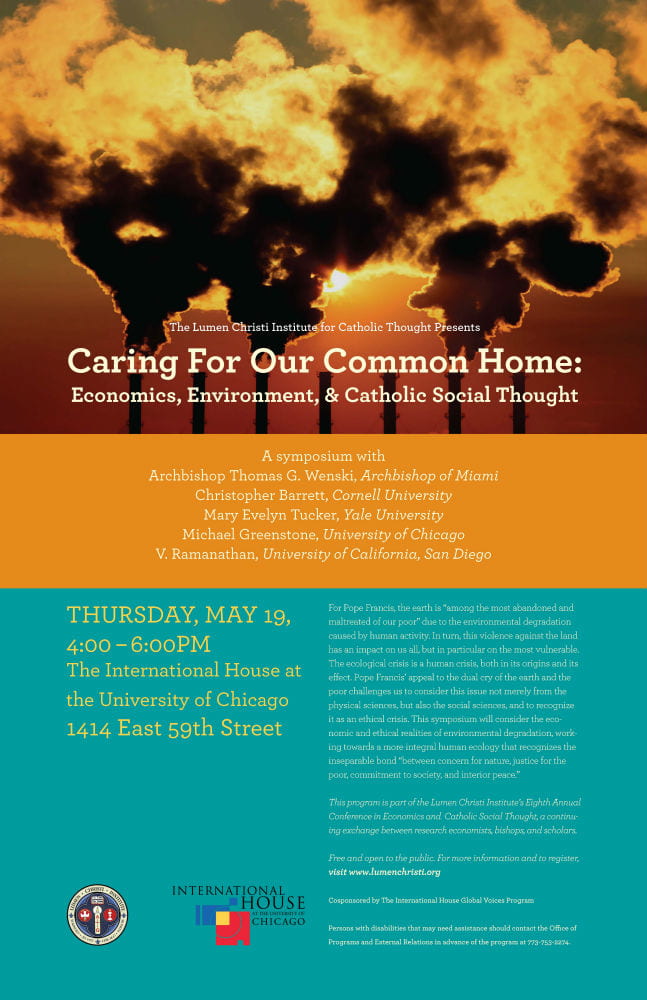Thursday, May 19, 2016
4-6PM
Assembly Hall
For Pope Francis, the earth is “among the most abandoned and maltreated of our poor” (Laudato Si’, 2) due to the environmental degradation caused by human activity. In turn, this violence against the land has an impact on us all, but in particular on the most vulnerable. The ecological crisis is a human crisis, both in its origins and effect. Pope Francis’ appeal to the dual cry of the earth and the poor challenges us to consider this issue not merely from the physical sciences, but also the social sciences, and to recognize it as an ethical crisis. This symposium will consider the economic and ethnical realties of environmental degradation, working toward a more integral human ecology that recognizes the inseparable bond “between concern for nature, justice for the poor, commitment to society, and interior peace” (10).
This program is part of the Lumen Christi Institute’s Eighth Annual Conference in Economics and Catholic Social Thought, a continuing exchange between research economists, bishops, and scholars.
Speakers will include:
Archbishop Thomas G. Wenski, Archbishop of Miami
Ordained in Miami in 1976, Archbishop Wenski earned a BA in Philosophy and an MDiv from Boynton Beach Seminary and a MA in Sociology from Fordham University. Besides his duties in the Archdiocese of Miami, he has served as chair of the United States Catholic Conference of Bishops’ Committee on Migration (2001-2004); and chair of the conference’s Committee on International Policy (2004-2008) and currently he continues as a member of the Conference’s Secretariat for the Church in Latin America, the committee for International Justice and Peace, CLINIC (Catholic Legal Immigration Network, Inc.), and as a consultant to the Committee on Migration. He currently serves as the chairman for the USCCB’s Committee on Domestic Justice and Human Development, and has spoken prolifically promoting Pope Francis’s encyclical, Laudato Si.
Christopher Barrett, Cornell University
Christopher Barrett is Stephen B. and Janice G. Ashley Professor of Applied Economics and Management and an International Professor of Agriculture at the Charles H. Dyson School of Applied Economics and Management, as well as a Professor in the Department of Economics and a Fellow of the David R. Atkinson Center for a Sustainable Future, as well as Deputy Dean and Dean of Academic Affairs at the College of Business, all at Cornell University. He has won several university, national and international awards for teaching, research and public outreach, and is an elected Fellow of both of the Agricultural and Applied Economics Association and of the African Association of Agricultural Economists. Prof. Barrett’s teaching, outreach, and research explore why unnecessary injustice continues to disfigure a rich, technologically advanced world and what individuals and institutions can do to improve matters.
Mary Evelyn Tucker, Yale University
As a Senior Lecturer and Research Scholar at Yale University, Tucker holds appointments in the Divinity School and in the School of Forestry and Environmental Studies. She is co-director with John Grim of the Forum on Religion and Ecology at Yale. This arose out of a series of 10 conferences that they organized at Harvard on World Religions and Ecology that resulted in 10 edited volumes from Harvard. She is also a research associate at the Reischauer Institute of Japanese Studies at Harvard. In 2011 she completed the Journey of the Universe with Brian Swimme which includes a volume published by Yale University Press, a PBS film, and an educational series of interviews. Among her many publications is Worldly Wonder: Religions Enter Their Ecological Phase (2003).
Michael Greenstone, The University of Chicago
Greenstone is the Milton Friedman Professor of Economics and the Director of the Energy Policy Institute at the University of Chicago. Previously, he was the 3M Professor of Environmental Economics in the Department of Economics at the Massachusetts Institute of Technology and the Director of The Hamilton Project. From 2009-10 he served as the chief economist at the White House’s Council of Economic Advisers. His research is focused on estimating the costs and benefits of environmental quality and the consequences of government regulation. Among Professor Greenstone’s many honors, he is an elected member of the American Academy of Arts and Sciences; Faculty Director of the E2e Project; Director of the Climate Change, Environment and Natural Resources Research Programme of the International Growth Centre; a Senior Fellow of the Brookings Institution; and Research Associate at the National Bureau of Economic Research.
V. Ramanathan, The University of California, San Diego
Ramanathan is a Distinguished Professor of Atmospheric and Climate Sciences at the Scripps Institution of Oceanography, University of California, San Diego. He currently chairs an international science team from Asia, Africa and Latin America under the Atmospheric Brown Clouds Program sponsored by the United Nations Environmental Programme. Professor Ramanathan has been conducting original research in Climate and Atmospheric Science since the 1970s. He discovered the super greenhouse effect of halo carbons (CFCs) in 1975 and used observations to quantify the large global warming effect of black carbon. In 2013, he was awarded the top environment prize from the United Nations, the Champions of Earth for Science and Innovation. He has been elected to the US National Academy of Sciences, American Philosophical Society, the Pontifical Academy by Pope John Paul II and the Royal Swedish Academy of Sciences. He is now serving in Pope Francis’ Council for the Pontifical Academy of Sciences.
Free and open to the public.
Sponsored by the Global Voices Lecture Series and the Lumen Christi Institute.
